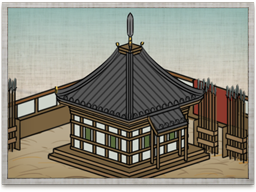Difference between revisions of "Yari Drill Yard (TWS2)"
(Created page with " {{Building TWS2|image=Image:Yari Drill Yard S2TW.png |Chain=Yari Type |Requires=- |Enables='''Buildings''':<li>[[Naginata Dojo (TWS...") |
m |
||
| Line 1: | Line 1: | ||
| − | {{Building | + | {{TWS2 Building|image=[[Image:Yari Drill Yard S2TW.png]] |
|Chain=[[:Category:TWS2_Building#Yari_Chain|Yari Type]] | |Chain=[[:Category:TWS2_Building#Yari_Chain|Yari Type]] | ||
|Requires=- | |Requires=- | ||
Revision as of 08:34, 21 December 2011
| Yari Drill Yard (TWS2) | |
|---|---|
 | |
| Chain | Yari Type |
| Requires | - |
| Enables | Buildings: |
| Spawned Defence Forces | - |
| Basic Building Statistics | - |
| Clan Effects | - |
| See main article; FotS Buildings | |
Description
An action does not require thought. The body will learn.
The drill yard allows the recruitment and training of yari-armed samurai units. Using a spear effectively in battle requires training, discipline and trust.
The art of using a spear, sojutsu, is one of many Japanese martial arts, and probably among the oldest. The spear was, with the bow, one of the traditional weapons of the samurai. The spear also has its place in Japanese mythology, because drops falling from the tip of ame-no-nuboko, the “Heavenly Jewelled Spear” formed the islands of Japan. This spear, however, is also referred to as a naginata, a slightly shorter slashing pole arm.
The spear came to be seen as a very cost-effective weapon for troops during the feudal wars of the Sengoku Jidai. Combined with bow and matchlock armed troops, spearmen formed the core of most clan armies. Spear fighting in Japan was a good deal more aggressive than the “push of pikes” that went on in European battles of roughly the same period. This probably reflected the more honour-bound and glory-hungry nature of Japanese warfare, as many European armies were full of mercenaries who could only be paid if they were still alive!